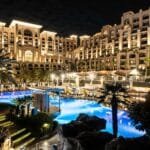
Introduction to Jeju Pension
A Traditional Jeju pension encompasses a distinctive form of accommodation found primarily on Jeju Island in South Korea. It differs significantly from the typical hotels and guesthouses commonly associated with mainstream tourism. This unique lodging option combines traditional Korean architectural elements with modern amenities, providing guests an authentic experience while ensuring comfort and convenience. Pensions in Jeju often reflect the island’s rich cultural heritage and natural beauty, making them an appealing choice for travelers seeking a deeper connection with the locale.
The origins of Jeju pensions can be traced back to the island’s agricultural and fishing communities, where local families began opening their homes to visitors in a bid to share their lifestyle and the serene environment of their surroundings. Over the years, these accommodations have evolved while retaining their traditional charm. Modern pensions are designed to accommodate a variety of preferences, featuring private rooms and communal areas, all crafted to offer a welcoming atmosphere that fosters interactions among guests.
In terms of architecture, many Jeju pensions incorporate local materials such as basalt stone and wooden beams, emphasizing harmony with the surrounding landscape. This design choice not only enhances the aesthetic appeal but also reflects sustainable practices that align with the island’s natural environment. Moreover, the traditional architecture resonates with visitors, offering a glimpse into the island’s history and lifestyle.
In recent years, Jeju pensions have gained popularity, particularly among domestic and international travelers who are seeking authentic experiences. It is a form of accommodation that appeals to those looking for a blend of local hospitality and contemporary comfort, positioning Jeju pensions as an integral part of the island’s tourism landscape.
Architectural Heritage of Jeju
Jeju Island, renowned for its natural beauty, also boasts a rich architectural heritage reflecting the island’s history and climate. Central to this architectural identity is the use of local materials, primarily basalt stone, which has been utilized for centuries in constructing homes, walls, and various structures. The island’s volcanic origin provides a sustainable source of this durable stone, characterized by its dark hue and rough texture. Buildings constructed from basalt not only exhibit resilience against the harsh island weather but also create a harmonious integration with the surrounding landscape.
Another significant feature of traditional Jeju architecture is the thatched roof, known as “yeomjeong.” These roofs are crafted from grass and are appreciated for their ability to regulate temperature effectively. During the hot summer months, the thatched roofs provide effective insulation, keeping the interiors cool and comfortable. In contrast, they offer protection from the cold winds that sweep across the island in winter. This ingenious roofing design exemplifies how local architecture is adapted to meet the specific climatic challenges of Jeju, highlighting its functional yet aesthetically pleasing qualities.
Wooden structures further complement Jeju’s traditional buildings, with timber being a prominent material in the construction of homes and communal spaces. The local variety of wood not only enhances the durability of these structures but also adds a warm and inviting character to the interiors. Large windows and open layouts in these homes emphasize a connection with nature, allowing residents to enjoy the breathtaking views that Jeju Island has to offer. Additionally, the architectural designs often feature spacious verandas and courtyards, reflecting a social lifestyle that embraces outdoor living.
In reviewing the architectural elements of Jeju, it becomes evident that the traditional style merges practicality with aesthetic appeal, resulting in homes that are not only beautiful but are exceptionally suited to the island’s unique environment.
Design Elements of a Traditional Jeju Pension
The design elements of a traditional Jeju pension reflect the harmonious balance between local architectural styles and modern comfort, fostering an inviting and cozy atmosphere for guests. One of the defining features is the floor plan, which typically follows a simple and functional layout. This often includes a central common area that encourages social interaction, flanked by individual guest rooms. The open space design maximizes accessibility, making it easy for guests to move between the indoor living areas and outdoor spaces.
Natural light plays a crucial role in the ambiance of a Jeju pension. Large windows and sliding doors are strategically placed to invite sunlight while offering stunning views of the island’s lush landscapes. The use of traditional materials, such as wood and stone, further enhances the light and warmth within the space. These materials serve not only aesthetic purposes but also contribute to the overall comfort levels of the accommodations. Interiors often feature wooden beams and flooring, creating a rustic yet modern feel that appeals to a wide range of visitors.
In addition to the interior design elements, outdoor spaces, such as gardens and patios, are integral to the experience of a traditional Jeju pension. These areas are designed to encourage relaxation and connection with nature. Many pensions feature manicured gardens filled with native Jeju plants, which not only enhance the visual appeal but also promote biodiversity. Patios equipped with comfortable seating provide guests with a serene environment to enjoy their surroundings while taking in the refreshing island air. The seamless integration of these elements ultimately creates a tranquil retreat that embodies the essence of Jeju’s natural beauty and cultural heritage.
Modern Amenities in Jeju Pensions
In recent years, the traditional Jeju pension has evolved to provide a distinctive fusion of local architecture with contemporary comforts. While these accommodations proudly showcase the island’s rich heritage through their design, they simultaneously incorporate modern amenities, ensuring that guests experience both authenticity and convenience during their stay. One notable enhancement is the availability of Wi-Fi, which allows visitors to stay connected with friends, family, and work, enabling social media sharing of picturesque views and memorable moments. This integration of digital connectivity reflects the changing expectations of travelers, particularly those who seek the charm of a traditional setting while prioritizing modern communication options.
Air conditioning is also increasingly integrated into Jeju pensions, addressing the region’s warm climate and providing guests with a comfortable indoor environment. This aspect is particularly significant for those visiting during the peak summer months, as it allows for a respite from the heat while still appreciating the surrounding beauty. The combination of traditional architecture with efficient cooling systems illustrates a commitment to guest comfort without compromising the unique essence of Jeju’s architectural style.
Modernized bathrooms represent another essential upgrade, featuring contemporary fixtures and designs that enhance the overall guest experience. These bathrooms often include amenities such as rain showers, heated floors, and luxury toiletries, catering to travelers’ increasing demands for quality and comfort. By redesigning these spaces while maintaining traditional aesthetics in the overall pension structure, proprietors succeed in creating an inviting atmosphere that respects the island’s cultural integrity. The emerging trend is clear: Jeju pensions are evolving, embracing modern amenities that not only improve guest satisfaction but also uphold the historical charm that defines these picturesque retreats.
Sustainable Practices in Jeju Pensions
In recent years, the concept of sustainability has gained significant traction within the hospitality industry, particularly among Jeju pensions. These traditional accommodations have begun to incorporate a myriad of eco-friendly practices that reflect their commitment to environmental stewardship while enhancing the guest experience.
One of the defining features of many Jeju pensions is their use of local materials in construction and design. By sourcing timber, stone, and other building elements from nearby suppliers, these establishments not only diminish their carbon footprint but also preserve the unique cultural identity of Jeju Island. This reliance on indigenous materials creates an authentic atmosphere that resonates with visitors, while simultaneously supporting the local economy.
Energy efficiency is another cornerstone of the sustainability initiatives in Jeju pensions. Many properties have embraced cutting-edge technologies such as solar panels and geothermal heating systems, which significantly reduce energy consumption. Implementing such energy-efficient systems not only minimizes the environmental impact but also lowers operational costs, allowing these pensions to pass savings onto guests through affordable pricing.
Furthermore, waste reduction strategies have become increasingly prevalent in the practices of Jeju pensions. Many establishments have adopted rigorous recycling programs and implemented composting initiatives for organic waste. Such measures demonstrate a profound commitment to reducing waste and advocating for responsible tourism. Visitors are often encouraged to participate in these programs, fostering a deeper understanding of the environmental challenges faced by the island.
By integrating these sustainable practices, Jeju pensions exemplify how it is possible to honor traditional values while meeting the modern expectations of travelers. The marriage of local architecture with contemporary eco-friendly solutions not only preserves the island’s rustic charm but also promotes a responsible and enriching travel experience.
Cultural Experiences Offered by Jeju Pensions
Staying at a traditional Jeju pension allows visitors to immerse themselves in the rich cultural heritage of the island, providing a unique blend of local architecture and modern comfort. One of the most sought-after experiences is participating in local cooking classes, where guests have the opportunity to learn about Jeju’s distinctive cuisine. These hands-on classes often focus on using fresh, local ingredients, enabling participants to create traditional dishes such as ‘heukdwaeji’ (black pork) or ‘haemul jjigae’ (seafood stew). Through these culinary workshops, guests not only gain practical cooking skills but also insight into the island’s gastronomic history and customs.
Another popular cultural activity is the traditional tea ceremony. Guests can engage in this serene practice, which emphasizes mindfulness and appreciation for the art of tea preparation. This experience typically showcases local teas, such as ‘Jeju green tea’ or ‘mokpo mugwort tea,’ highlighting the island’s biodiversity. Participants learn about the significance of tea in Korean culture, along with the correct techniques for brewing and serving. Engaging in a tea ceremony cultivates a deeper understanding of Jeju’s cultural values and traditions.
Guided nature tours are also an integral part of the cultural experiences offered by Jeju pensions. These tours often take visitors through the island’s stunning landscapes, including Hallasan Mountain and the coastal cliffs. A knowledgeable guide typically shares stories about the historical and ecological significance of various sites, allowing guests to appreciate the connection between the environment and Jeju’s culture. These excursions can include visits to local farms, traditional villages, or historical landmarks, enriching the overall experience of staying in a traditional Jeju pension. Each activity complements the unique atmosphere of the pensions, ensuring that guests depart with cherished memories and a profound appreciation for Jeju’s cultural landscape.
Guest Testimonials and Experiences
Staying at a traditional Jeju pension is often described by guests as an unforgettable experience that combines local culture with modern comfort. Many visitors have shared their enthusiastic feedback, highlighting the unique architectural elements that transport them to a different time. One guest recounted, “The thatched roofs and stone walls of the pension created a picturesque sight, reminiscent of old Jeju. It felt like stepping back in history while enjoying all the conveniences of the present.” This sentiment is echoed by numerous travelers who appreciate the aesthetic appeal of these accommodations.
Hospitality is another aspect that guests consistently praise. One visitor commented, “The owners treated us like family. They greeted us with warm smiles and even shared stories about the history of Jeju. Their kindness made our stay even more memorable.” Such anecdotes illustrate how the personal touch offered by pension hosts enhances the overall guest experience. Travelers often note that this warm hospitality, coupled with the local architecture, helps immerse them in the culture of Jeju Island.
The unique atmosphere of a traditional Jeju pension is also a common theme in testimonials. A guest shared, “Waking up to the sound of nature and enjoying breakfast made with fresh local ingredients on the terrace was a delight. It created a peaceful setting that is hard to find in more commercial hotels.” This connection to the natural environment is frequently mentioned in reviews, reinforcing the tranquil and restorative experience many guests seek.
In conclusion, the testimonials from guests who have experienced traditional Jeju pensions reflect a harmonious blend of local architecture, heartfelt hospitality, and a serene atmosphere. These firsthand accounts provide valuable insights, revealing the distinct charm and comfort that awaits potential visitors, encouraging them to choose this unique accommodation option for their visit to Jeju Island.
Choosing the Right Jeju Pension for Your Stay
Selecting the ideal Jeju pension for your accommodation needs is essential for ensuring a memorable experience on this picturesque island. Several factors should be considered to tailor your choice, including location, amenities, pricing, and architectural style. Each of these aspects can significantly impact your stay, helping you create the perfect blend of local charm and modern comfort.
Location is one of the foremost considerations when choosing a Jeju pension. Decide whether you prefer a peaceful retreat near the outskirts, surrounded by natural beauty, or a more vibrant location near city attractions. Access to transportation and proximity to key sites such as beaches, hiking trails, and cultural landmarks can enhance your stay significantly. Determine which areas resonate with your interests and make a selection accordingly.
The types of amenities offered should also align with your needs and preferences. Modern Jeju pensions frequently provide a combination of traditional and contemporary features, such as private bathrooms, well-equipped kitchens, and outdoor spaces. Some establishments even offer special touches like Korean-style ondol heating or access to communal gardens, allowing guests to enjoy an authentic experience in comfort.
Pricing should be assessed in relation to the features offered. Jeju pensions often vary widely in price point based on location, amenities, and level of service. Conducting thorough research helps in identifying a rental that fits within your budget while still providing a satisfactory level of comfort and experience. Consider availability during peak seasons, as prices may surge during these periods.
Additionally, reflect on your style preferences. Whether you prefer a traditional, rustic vibe or a sleek, modern design will influence your choice of Jeju pension. Reviewing guest testimonials and images can assist you in finding the perfect match. Engaging with various online platforms will reveal detailed insights, guiding you towards a suitable decision. By carefully considering these elements, you can find a Jeju pension that meets your expectations for a relaxing and enriching stay.
Conclusion: The Allure of Traditional Jeju Pensions
Traditional Jeju pensions present a remarkable opportunity for travelers seeking an authentic experience where local architectural beauty harmonizes with contemporary conveniences. These establishments are not merely places to rest; they are carefully curated spaces that embody the essence of Jeju’s rich culture and history. The unique design elements, such as the use of volcanic rock and thatched roofs, provide visitors with a sense of place that distinctly connects them to the island’s heritage.
Moreover, the modern amenities offered by these pensions ensure that guests do not sacrifice comfort for tradition. Each pension is equipped with functional conveniences that cater to the needs of today’s travelers, blending the charm of local craftsmanship with the practicality required in a busy travel lifestyle. In this way, traditional Jeju pensions stand as a testament to the island’s ability to maintain its cultural identity while adapting to the demands of modern-day tourism.
Staying in a traditional Jeju pension allows guests to immerse themselves in the island’s hospitality. The warm welcomes and personalized services provided by the pension owners enhance the experience, making every visitor feel like part of the community. It creates an opportunity not only to enjoy the scenic beauty of Jeju but also to engage with its people in a meaningful way.
In conclusion, experiencing the allure of traditional Jeju pensions offers a unique adventure for travelers. These accommodations serve as a perfect blend of local architecture and modern comfort, enticing anyone looking to delve into the heart of Jeju’s cultural landscape. A stay at a Jeju pension is more than just lodging; it is an invitation to connect with the island’s heritage in a profound and personal manner.
Join the fun and start traveling now!
A Comprehensive Review of Lotte Hotel Jeju: Luxury, Ocean Views, and Exceptional Dining Experiences




